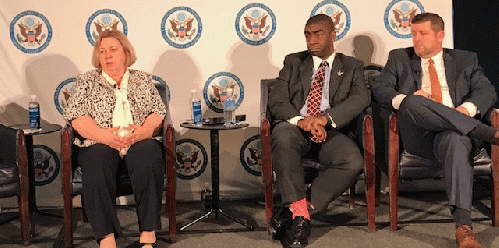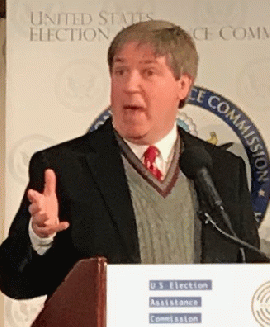
The three EAC commissioners: Christy McCormick, Thomas Hicks, and Matthew Masterson
(Image by Marta Steele) Details DMCA
On the day when the U.S. Supreme Court was hearing its second case this term involving voting rights, on possibly unjustified purging of names from voter rolls in Ohio; on the third anniversary of the three EAC (Election Assistance Commission) commissioners' time together as colleagues; on the first anniversary of the declaration of election systems as critical infrastructure, and in the immediate wake of the dissolution of Trump's "Presidential Advisory Commission on Election Integrity, "the U.S. Election Assistance Commission was looking forward, not back. The subject was Election 2018 and "a spectrum of issues that state and local election officials will face as they work to administer secure, accessible and efficient federal elections in the coming year."
Most of the audience were election officials or activists. Several were secretaries of state who had flown in to attend from as far away as Washington state and Nevada as well as Rhode Island (I note in passing that all three mentioned were women).
First to speak, keynote speaker Doug Chapin of the Humphrey School of Public Affairs at the University of Minnesota, happily bid good riddance to the year 2017. He said what's best about banging your head against a brick wall is that it feels good to stop.
He was glad that it is 2018 and speculated about the November midterm election. He expects a large turnout; lots of congressional seats are changing hands; a reduced amount of revenue is expected; the SCOTUS decision on the Ohio case being tried today could reverberate around the country; interest in vote by mail (VBM) and vote centers is increasing; and it is the worst time to change election laws.
Moreover, the 800-pound elephant in the room is Russia's interference with the 2016 elections in this country. Election officials must focus on cybersecurity now: with better password management, by fighting off phishing attempts, and by protecting sensitive data. Cybersecurity is the key to preserving election integrity and individual voters.
On all these issues, Chapin said, voters' input is of vital importance. The challenges are vast.
The first panel, led by EAC commissioner Christy McCormick, concerned election efficiency and integrity, specifically the importance of data and how we use it.
The panelists were Nevada Secretary of State Barbara Cegavske; Krysha Gregorowicz, Senior Researcher, Fors Marsh Group; Michael Scarpello, Registrar of Voters, San Bernardino County, California, the largest electoral district in this country; and Charles Stewart III. an MIT professor who has worked on the Cal Tech-MIT Voting Project since 1985, which in 2001 pronounced hand-counted paper ballots (HCPB) as by far the best system for accurately counting votes and vehemently opposed the introduction of electronic voting systems. That was a long time ago.
Mr. Scarpello detailed the numerous and complicated considerations involved in data analysis at the level of polling places: user-friendly parking lots adjacent; voter turnout, where voters live, when they vote and how they vote--there are even drop-off vote-by-mail (VBM) ballots to consider; the number of voters who appear per hour; what and how many supplies to distribute at each location--there are 400 different ballot types--and how many poll workers should be stationed at each place.
Each location is surveyed on Election Day to assess the level of voter convenience in terms of number and location of each site, the time taken to process ballots--there are 3500 poll workers in the county and 5000 are trained; moreove,r voters speak six different languages within the radius of 20,000 square miles.
Said Mr. Gregorowicz, so much data are collected and there are thousands of discreet state and local levels, so that common definitions of data are sorely needed. There are 178,000 individual polling places in the country and 775 different registration forms, of which departments of motor vehicles handle one-third. Without common definitions comparisons are difficult.
But with common definitions the future holds many possibilities.
Dr. Stewart added that research toward improving elections is a goal shared among all of us. There are lots of success stories. As a Florida native, he said, he's always been interested in election administration and found that problems of course vary according to locations. His project mulls over how best to use data already collected--so much is available. Millions of votes were lost in his state in 2000, including three million registration problems that kept voters from voting. More problems occurred at the absentee level, due to problems with machinery, or polling-place issues, all of these comprising a gauge of how well democracy is working.
(Note: You can view every article as one long page if you sign up as an Advocate Member, or higher).







